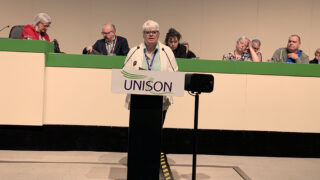NHS staff suffering with long Covid symptoms are returning to work early because they’re afraid of losing their jobs, according to a UNISON survey published today (Wednesday).
Anxiety, fear and ‘shockingly bad’ treatment from managers are among the reasons staff gave for returning to work before they felt well enough, says the union.
The research, published during the union’s annual health conference in Liverpool, gives a snapshot of the challenges frontline staff with long Covid face as they try to return to work, says UNISON.
In a wider survey of health workers, 1,900 of the respondents including healthcare assistants, nurses, porters and clinical support staff, reported having had or still experiencing long Covid symptoms.
More than two in three (68%) were back in the workplace while suffering with symptoms including breathlessness, fatigue, brain fog and aching joints.
Eight per cent of those surveyed have been so poorly they’ve not been able to go back to work at all. Almost a quarter (24%) say they’ve fully recovered.
Four in ten (43%) of the health workers who have or who’ve had long Covid say their employer went the extra mile when it came to giving them support to return to work. This included adjusting job roles, enabling a flexible return to work, or allowing time off without staff using up their sickness or leave entitlement.
But more than four in ten (46%) say that although their employer was initially supportive, this changed as time went on. Almost one in ten (9%) have been asked to attend a formal absence hearing, and 2% report being threatened with disciplinary action or even the sack, says UNISON.
A motion passed during the conference asks employers to do more to support staff with long Covid back into the workforce by making reasonable adjustments to their roles.
During the debate, delegates heard that Black NHS staff with long Covid are more likely to face the harshest punishments. Sickness absence and performance management systems are also more frequently used against Black staff reporting long Covid symptoms, UNISON adds.
Threatening, punishing, bullying or blaming staff with long Covid risks driving experienced employees out of the health service at a time of unprecedented demand, warns UNISON.
UNISON head of health Sara Gorton said: “Long Covid must be seen and treated as a disability so staff with the condition are protected and supported to return to work. Some health workers are being punished for being ill and risk being driven out of the health service, just when they are needed the most.
“That so many NHS staff are back at work despite still being poorly illustrates their dedication to their jobs. But some are likely to be returning too soon because they’re worried that managers will turn against them if they take the time they need to recover fully. This is no way to treat staff who’ve given their all to get the nation through the pandemic.
“Health leaders need to understand the impact that poor management of long Covid is having on retention and take immediate action.”
Notes to editors:
-Health workers have shared their long Covid experiences (names have been changed):
Lucy, who has worked for the NHS for 17 years said: “I was off work with long Covid from last summer to earlier this year. I’m still ill but as the main breadwinner I was worried sick I’d lose my job and then my home. My doctor said I wasn’t well enough to go to work but I felt I had no choice. Most days I feel like I’ve just been run over. Sometimes I hear other staff suggesting I’m milking it, but I just ignore them and get on with what I have to do.”
Abby works in care home administration said: “My manager’s behaviour towards me was shockingly bad. There was no empathy, and no encouragement. Even now when someone rings in to say they’ve got Covid, their eyes roll. It doesn’t make staff want to come back to work. We don’t feel valued. I’m looking to leave because of the lack of the support.”
-UNISON’s annual health conference is taking place in Liverpool and finishes at lunchtime today.
-A total of 11,954 health workers completed the survey between Thursday 14 April and Thursday 21 April 2022. Of these 1,916 NHS workers reported either that they have or have had long Covid.
-UNISON is the UK’s largest union, with more than 1.3 million members providing public services in education, local government, the NHS, police service and energy. They are employed in the public, voluntary and private sectors.



